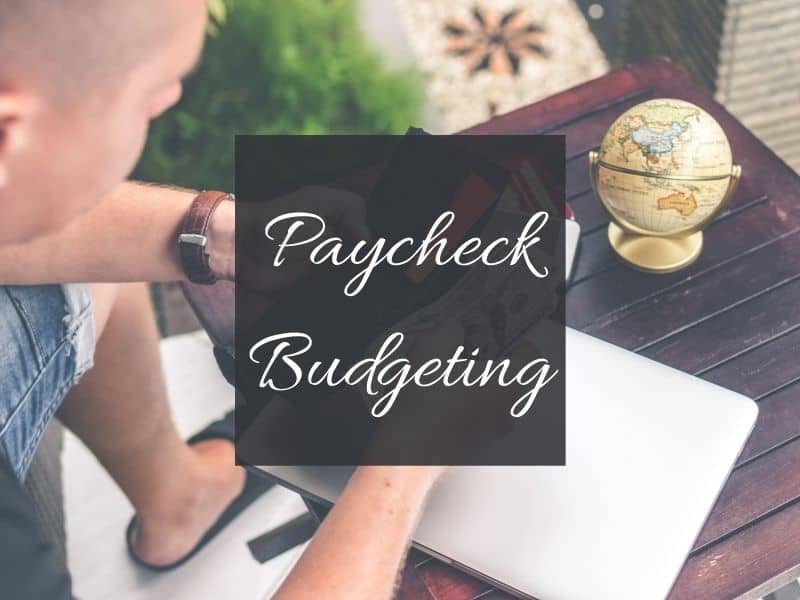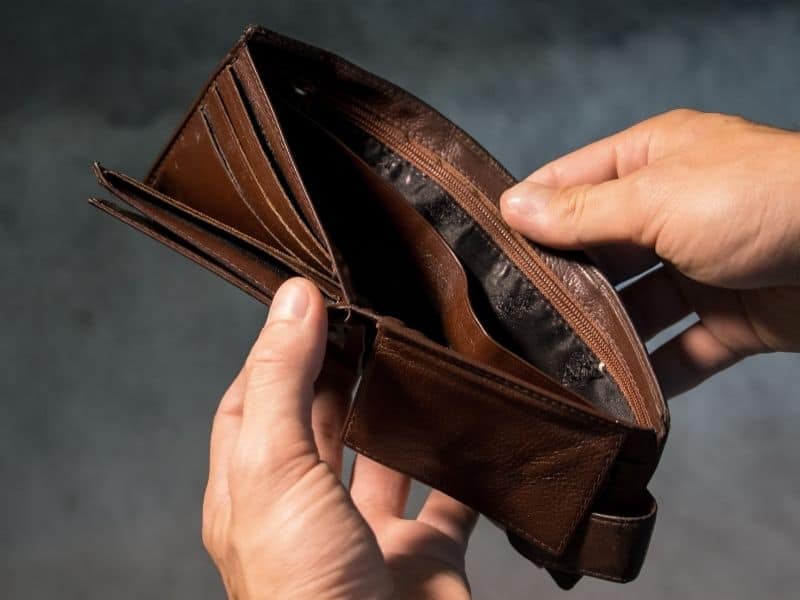Learn how to better manage your finances and find out where your money is going with paycheck budgeting. Stop living paycheck to paycheck and learn some budgeting techniques!

Do you feel like it’s time to get control of your money? Do you want more insight into where your money goes every pay day? If so, maybe it’s time for you to learn about how to implement paycheck budgeting.
Paycheck budgeting can help you learn more about where your money goes and make you more confident in managing your finances every month. So many people feel like they have no control over their money.
They may try to set up a budget, but after a month or two, overwhelm sets in and they give up.
Budgeting by paycheck is a super easy system to implement and even better, using it will allow you to feel more confident about how you’re spending your money each paycheck, and to create a strategic financial plan for your future!
No more being broke before your next pay day, especially if you are using some of the tried and true frugal living tips and learning how to live cheap!
You’ll definitely also want to check out Dave Ramsey’s 7 baby steps and these books about budgeting.
What is Paycheck Budgeting?
Budgeting by paycheck is simply budgeting your expenses based on each paycheck rather than once a month. It allows you to get a better picture of your money because you’re reviewing your money more often.
Related: 100+ Personal Budget Categories

The Benefits of Using Paycheck Budgeting
Paycheck budgeting is an awesome way to get a handle on your finances. The more often you look at something, the more familiar you become with it. And finances are no different.
So, if you only review your budget once a month like a lot of people, you won’t have as clear a picture of your finances as you would by reviewing your budget twice a month or even weekly.
Another benefit of budgeting by paycheck is that it can help you keep track of your checking account balance more closely. I don’t know about you, but I think it’s super easy to grab my debit card and swipe away!
Learning how to organize your monthly bills is going to help immensely when starting to use budgeting techniques.
And it’s so easy to forget how even the little things add up. Overspending can totally sneak up on you if you’re not aware of your checking account balance. That’s less likely to happen with paycheck budgeting.
Related: How to Stop Buying Stuff
Plus, since you’re reviewing your checking account balances more often, it can also help you avoid overdraft fees!
Reviewing your finances more often enables you to have a better understanding of what’s working in your budget and what’s not. If you’re using paycheck budgeting, you can more quickly see any areas of your budget that aren’t working as effectively as you’d like and immediately tweak your budget and/or spending.
For example, let’s say you get paid once a week and you budget $100 per week for food. If you budget by paycheck, you’ll know every week how much you’re spending on food.
Let’s say you’ve noticed that for a few weeks in row you’ve only spent $75 on food. Now you can quickly change your budget and put the extra $25 towards another budget category.
Related: The Key to Budget Cutting
Check out these awesome budget planners to get started! You can also just use paper, computer or anything that makes sense to you, but I personally like to have a planner. Using an app like Mint or Quicken can help too.

Who Should Use Paycheck Budgeting?
Almost everyone can benefit from using paycheck budgeting, but it’s especially helpful for:
- People that get paid more than once a month
- People new to budgeting: If you’re newer to budgeting, paycheck budgeting is a great way to start budgeting. It’s simple to learn and a very effective way to keep tabs on your money.
- People that live paycheck to paycheck
- Anyone who wants to track their finances more closely
How to Get Started
First off, verify your paycheck is deposited in your account like it should be. Yes, it should happen automatically but it’s always good to check because mistakes happen.
In addition to making sure your check is auto deposited in your account, verify the amount is correct. Again, it should be correct every payday, but it’s a good idea to verify before you start spending any of your money.
Once you know you’re good to go, grab your budget for this paycheck and get to work!
Basically, what you should do every time you get paid is sit down with your calendar, calculator and your bills and make a plan for your money. You can use a budgeting app like Mint or YNAB or you can just use a sheet of paper or notebook (or one of these awesome budget planners).
Whatever you do, don’t rush through this process. Finances are important and if you want to achieve financial success, you’ll want to take the time to really study where your money is going.
You won’t make financial gains without making a plan for your money!
I also highly recommend creating a monthly meal plan to help you avoid spending on unnecessary food!

How to Budget for Twice Monthly (Bimonthly) Paychecks
First you need to calculate how much you spend each month or each pay period. If you don’t know your monthly or pay period expenses you need to figure those out first.
I recommend tracking your spending for at least one to two months before implementing your budgeting by paycheck system. This is because you need to have a clear understanding of what your expenses are before you can accurately plan for how to pay those expenses.
Once you know your expenses for each month or each pay period, it’s a matter of plugging in the numbers for each paycheck and making sure your expenses are even allocated from each paycheck.
Your goal is to have roughly the same amount of money coming out of each paycheck. This will help you to have a consistent money stream rather than having a ton of extra money from one paycheck and being broke the next paycheck.
What About Variable Expenses?
Everyone has unplanned expenses. How should you account for these if you’re doing budgeting by paycheck? Variable expenses can be fun things like vacations or not so fun things like vet bills.
Either way, there’s a variety of ways you can tackle these variable expenses so they don’t turn into budget busters!
The most important thing to remember is that you have to plan for unplanned expenses, just like you plan for all your recurring expenses. Let’s face it. We all know the unexpected will happen.
At some point, your car will need new tires and your water heater will go on the fritz. While you don’t know just exactly when it will happen or what it will cost, if you’re prepared, you’ll be able to handle it.
A great way to start getting a handle on your variable expenses is trying a no spend challenge to see what you can live without.
Ways to Budget for Variable Expenses
Set Up an Emergency Fund
Everyone should have an emergency fund that covers at least 6 months of expenses. You can dip into your emergency fund to cover unplanned expenses.
Create Different Savings Accounts
Setting up separate savings accounts for things like vacations and Christmas and auto transferring money into the accounts each payday is one way to account for variable expenses.
Establish A Sinking Fund and Add as a Budget Item
Similar to setting up a separate savings account, you can set up a sinking fund to cover variable expenses like car repairs and medical expenses. With a sinking fund, first you establish how much to allocate to the fund, then you’ll divide that by the number of months until you have to make the purchase.
With paycheck budgeting, you’ll take it one step further and break it down into saving a certain amount in that sinking fund every paycheck.
Here’s an Example of Twice Monthly Paycheck Budgeting
Take Home Pay: $4000: $2000 twice per month
Monthly Budget:
Rent $1200
Savings $600: $400 Retirement and $200 in Sinking Fund
Food $600 (read how to buy groceries on a budget)
Car Payment $300
Car Insurance $200
Health and Life Insurance $300
Utilities $200 (how reduce your electric bill)
Phone $100
Gas $100
Entertainment & Misc. $400 (if you’re really trying to save like a Rockstar, cut this in half and try some of these cheap date ideas)
Total Expenses for the month are $4000
Now we want to break down the $4000 expenses to fit into our twice monthly pay of $2000. We know that we get paid $2000 each paycheck, so now we plug our monthly expenses into each paycheck until we have a slot for each expense.
The trick is to break out expenses as evenly as possible so that each pay period you’re spending about the same amount of money.
Pay on 1st of Month: $2000
Rent $1200
Savings $300
Food $300
Entertainment & Misc. $200
Budget Total: $2000
Pay on 15th of the Month: $2000
Savings $300
Car Payment $300
Car Insurance $200
Health Insurance $300
Utilities $200
Gas $100
Phone $100
Food $300
Entertainment & Misc. $200
Budget Total: $2000
With the budget by paycheck method, each time we get paid we have a plan for exactly how that paycheck will be spent. Whether it’s spent on bills, savings or miscellaneous entertainment, each dollar of each paycheck is accounted for.
Use the cash envelope system to keep on track with staying in budget!
This way every expense is paid, either from one paycheck (like rent) or the expense is paid through a combination of both paychecks (like food).
How to Budget a Weekly Paycheck
If you get paid weekly, you’d take your monthly income and expenses and break that down into 4 even amounts.
Here is an example of how your budget would look if you get paid weekly.
Take Home Pay: $4000: $1000 paid every week.
Week 1
Rent $300
Savings $150
Food $150
Car Payment $75
Car Insurance $50
Health Insurance $75
Utilities $50
Phone $25
Gas $25
Entertainment & Misc. $100
Budget Total: $1000
Week 2
Rent $300
Savings $150
Food $150
Car Payment $75
Car Insurance $50
Health Insurance $75
Utilities $50
Phone $25
Gas $25
Entertainment & Misc. $100
Budget Total: $1000
Week 3
Rent $300
Savings $150
Food $150
Car Payment $75
Car Insurance $50
Health Insurance $75
Utilities $50
Phone $25
Gas $25
Entertainment & Misc. $100
Budget Total: $1000
Week 4
Rent $300
Savings $150
Food $150
Car Payment $75
Car Insurance $50
Health Insurance $75
Utilities $50
Phone $25
Gas $25
Entertainment & Misc. $100
Budget Total: $1000
In Summary
Whether you get paid monthly, bi-monthly, or weekly, you should be able to budget your expense by paycheck. By taking a few extra moments each week, you can come up with a plan so you don’t have to be broke again and have a plan in case of any financial hardships that come up!
Try some of the best budget apps for couples to help you with your budgeting!
Plus, by budgeting your expense properly, you are able to save an emergency fund, save for fun activities, and get one step closer to financial freedom!
Hi I’m Ana. I’m all about trying to live the best life you can. This blog is all about working to become physically healthy, mentally healthy and financially free! There lots of DIY tips, personal finance tips and just general tips on how to live the best life.


Leave a Reply